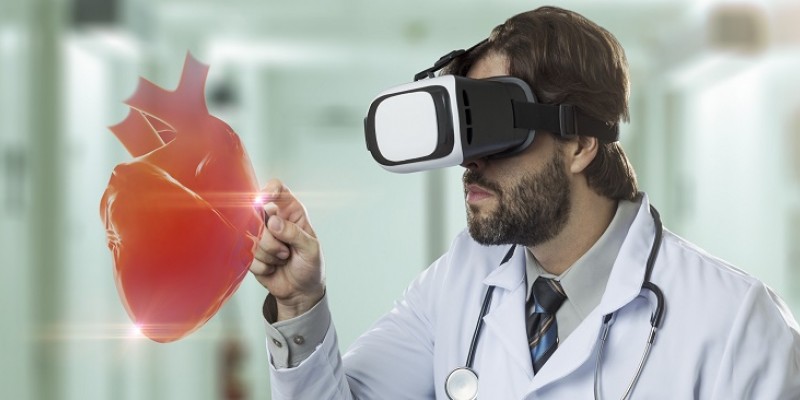
Virtual Reality started out as an elusive sci-fi dream, set to revolutionise the gaming industry by transporting the user to new worlds, but it's having a far more profound and far-reaching impact on the world.
From blindly reaching around in the dark, computer scientists soon realised it could be so much more. Combining head gear with hardware meant that the user could be propelled into fresh, unique, and potentially dangerous scenarios.
One such field that has adopted VR is healthcare. Now, everything from complex surgeries to patient reassurance can be digitised on a headset. But is it for the best?
Complex procedures
Year on year, surgery is processing at a breakneck speed, with new possibilities on what is possible and new techniques simplifying once complex procedures.
One such example is Dr Burke using Google Cardboard - an inexpensive device that turns a phone into a VR headset - to map a baby girl's heart prior to surgery. The VR image allowed the surgeons to move around the heart, learn how it was positioned and even view inside the damaged organ. Where once inoperable, the girl's life was saved, all thanks to VR.
The more routine is also being shaped by VR. The NHS now uses 20 specialist simulator centres across the UK, allowing trainee doctors to put themselves in situations where surgery has gone wrong. They can learn exactly what to do without ever stepping foot into a real life operating theatre or risking a patient's life. But, it comes at a cost. Patients now expect consultants and not junior doctors to perform operations, meaning less and less real life experience for future leaders.
Patient reassurance
For some, there is nothing scarier than going under the knife for a potentially life-saving operation. The fear of the unknown - what will happen when under anaesthetic - can make the few hours prior to an operation unnerving.
Oncomfort allows doctors to walk patients through every step of the operation to ease anxiety and stress, and prepare them for pain management control for afterwards.
With different programmes for different situations, Oncomfort means that outcomes, time spent in theatre and medical terms are all explained in advance. Subsequently, patients are so immersed that their perceptions of pain and time changes.
Currently used by more than 20 doctors across the US and Europe, Oncomfort could drastically increase patient satisfaction of operations.
Therapy and PTSD
Post Traumatic Stress Disorder can ruin lives. When returning from war or high levels of trauma, getting a patient to open up and move past their trigger can be a challenge. Previously, therapists have used the like of hypnotherapy to get patients to relive that situation and walk them through it. Not always successful, VR is now stepping in to plug that gap.
A real life situation, such as a battlefield, can be rebuilt and shown to the patient, triggering what caused their PTSD in a safe environment. The therapist, also able to see the images, can then walk the patient through the scenario and teach them how to cope with it.
Bravemind is one such programme that is allowing this to gain traction "because it allows interactive, multisensory, immersive environments to be readily created".
Looking to the future
While still in relatively early days, VR has the power to drastically change the future of healthcare through training, big data analytics, sensors, 3D mapping and immersive environments. Already gaining traction with clinicians, and opening the door for new breakthroughs, VR innovation will increasingly impact that way patients are assessed, treated and cared for.
To find out more about VR, and the way it is helping to shape the medical world, register for the VR World Congress in Bristol on the 11-13 of April. Enterprise Europe Network SW is also hosting a matchmaking event to link stakeholders with R&D projects, start-ups, and developers from the industry.
- Log in to post comments
Strategic support to help your business grow
Our innovation specialists will help you identify barriers to innovation and growth, and help you enhance your innovation capabilities to achieve business growth.
